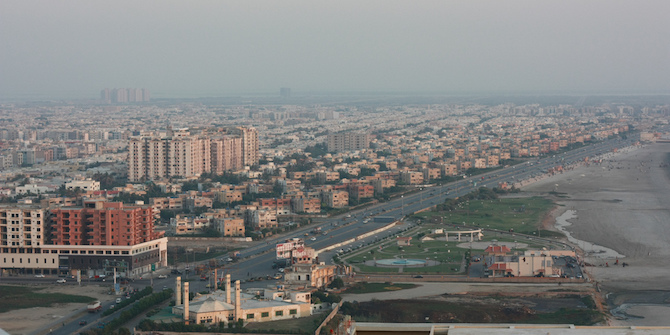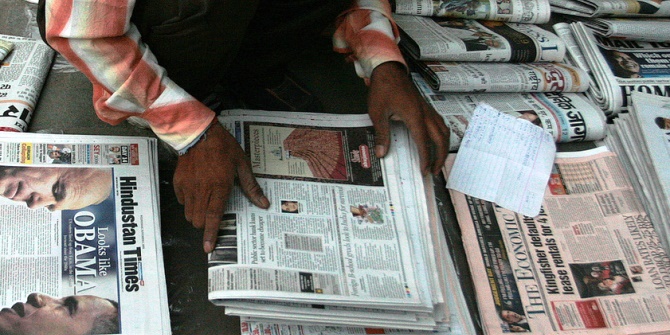 At the LSE India Summit 2017 Rebecca Bowers spoke to panellist Anu Aga about her insights on CSR collaboration between sectors and the philanthropic work around malnourishment and education she is involved in.
At the LSE India Summit 2017 Rebecca Bowers spoke to panellist Anu Aga about her insights on CSR collaboration between sectors and the philanthropic work around malnourishment and education she is involved in.
RB: Given your extensive experience, what would you say the main challenges for companies implementing CSR in India today?
AA: I think that selecting the right issue for which you feel passionately is very important rather than doling out a little bit to anyone who asks you or helping 10,000 causes a little bit. The challenge then is to find the right cause and not just write out a cheque. Writing out a cheque is relatively easy but I feel you get far more if you involve yourself and your employees and get to know the issues. You can help with whatever managerial talent they need, training, scaling up, or with connecting them to other NGOs – for example, Dasra in India does magnificent work with other NGOs.
The second challenge is to critically evaluate your work and publish the good things on your company website but learn. I think if you only show your best foot you will never learn so don’t be afraid to make mistakes and say where you have gone wrong. For example, being in Delhi most of the time I was away from my team. The foundation team only interacted with my leader and didn’t know that the people working there were not happy. About five left me out of a group of nine, which is a big number. I got very disheartened but I realised we had to give the leader another chance with lots of feedback and we are rebuilding the team. There will be problems, even crises, but you will carry on because you believe in what you’re doing. The other question is can you join hands with other corporates to make a bigger impact?
So I would say collaborate with NGOs, government, other corporates. It can be a little difficult working with other people, but it’s also very satisfying if you do it the right way.
You mentioned three main issues you found concerning: malnourishment; education; and skills training. How can companies help alleviate these through effective CSR?
On malnourishment, corporates can fund organisations like [Akshaya] Patra, which give a nourishing midday meal. I also think they need to advocate giving unpolished rice because at the moment in midday meals only polished rice is given, which is just starch. It is not nourishment. I’ve been telling a lot of people, but more and more corporates keep saying the same thing: it would help.
We have been very much seeped in the issue of improving the quality of education. We have been doing a lot of things. We haven’t done very much in skill building yet. I know it needs to be done, but as I said, one corporate cannot reach out to all of the causes.
What would you say other countries can learn from India’s CSR laws, and do you think they go far enough?
As I’m not in favour compulsory CSR I think they could learn not to mandate it. Even if governments make it compulsory they should not dictate to the corporates how the money should be spent. They’ve never done it with me, but I’m told that government is now insisting that corporates build toilets for schools and villages. I think it’s a wonderful idea, provided those toilets work. In many cases, the toilets are dirty, there is no way to clean them. They haven’t taught the children to change their habits so they still like to go outside and so on. So the countries can ask, if CSR is compulsory, how can they ensure it makes a deep impact?
Rukmini Banerji, one of our panellists from the 2016 Summit, discussed how children are leaving school with a very formalised but inadequate education. Could you on how companies and NGOs could work together to best address these challenges drawing from your own experiences, both from Thermax’s CSR program and in your role in Teach For India?
Pune is a unique city where we have been doing a little bit to improve schools. We have impacted fifteen schools in Pune through Akanksha, a few through Teach for India, and through our foundation we used to do teacher training in English medium schools which was very effective. The government doesn’t do any teacher training effectively and then they write off teachers saying they are no good. But if you don’t invest in teachers, how can they be good?
Having said that, we were focusing on English medium schools which are only about 34 compared to 230 schools which are mostly Marathi medium, and some Urdu medium. So we took up a project called Pune City Connect whereby we decided to change the whole landscape of Pune over time. We strengthened the sahyogi which are the trainers for the teachers. In addition, for the first time perhaps, we got the union permission to replace some of the old sahyogis who were not effective. The union allowed it, maybe because we were involved with the municipal commissioner, so more than half the sahyogis were changed. We trained them intensely, and they in turn do in service training. The results may not be dramatic and overnight but I’m sure it’s going to change.
Another thing we’ve created is 10 or 12 model schools. We are demonstrating through these model schools that quality can be substantially improved. What is a difference between a model school and a regular school? Most municipal schools run in two shifts so there are very few hours of learning. In model schools you have to have at least the normal 7-8 hours of learning. You cannot share the school premises with another school. The focus on the language will be Marathi or Urdu but by fifth standard there will be an excellent English teacher. So far they have such terrible English teachers that even if they claim to teach in English, the children don’t end up learning any language. There will be a social worker attached to each school. In education there are so many emotional and social problems that have come in the way, and unless we address them, a child will not do well. The things we do in the model school will really improve the quality. So municipal schools with the same teachers will be able to look to the for examples of how to change and improve their quality.
So then you can scale up with these best practice examples?
Absolutely. And the government will see also that it’s possible, with a little bit of support from corporates and NGOs. It’s their schools which are changing.
Thank you so much Anu for your time today.
Most welcome.
This interview is also available as a podcast. Listen here.
Cover image credit: Tom Maisey CC BY 2.0
This article gives the views of the interviewee, and not the position of the South Asia @ LSE blog, nor of the London School of Economics. Please read our comments policy before posting.
About the Authors
 Anu Aga is a businesswoman and social worker, currently serving as Chairperson of the Teach for India campaign. She is former Chairperson of Thermax Ltd.
Anu Aga is a businesswoman and social worker, currently serving as Chairperson of the Teach for India campaign. She is former Chairperson of Thermax Ltd.
 Rebecca Bowers is a final year PhD student in the anthropology department at the London School of Economics. Rebecca’s research explores the lives of female construction workers and their families in Bengaluru, India.
Rebecca Bowers is a final year PhD student in the anthropology department at the London School of Economics. Rebecca’s research explores the lives of female construction workers and their families in Bengaluru, India.







